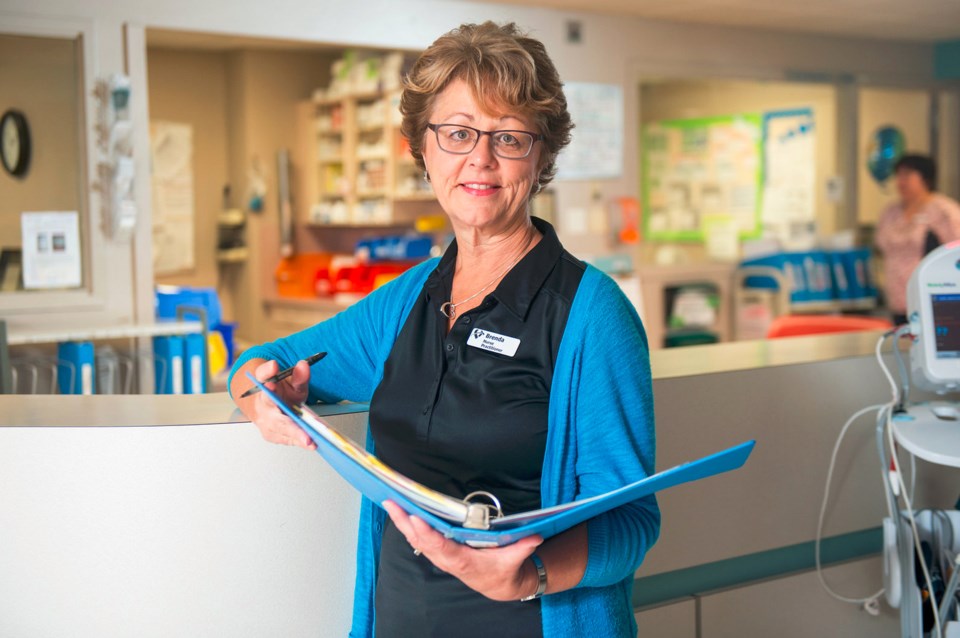When Royal Columbian Hospital nurse practitioner Brenda Poulton’s father was diagnosed with cancer at age 74 in 1998, one thing that came with the disease was a lot of pain.
It left his daughter, who was working on a bachelor of science in nursing at the time, feeling helpless, and she was frustrated by the health-care system’s response.
“Any time you either are a patient yourself or have a family member a patient, it certainly gives you a new window into health care and the system and the caring people that you come in contact with – but also sometimes the gaps that exist within that system,” Poulton told the Record.
Since then, she has set out to fill some of those gaps, and, over the course of her career, she has helped shape Fraser Health’s approach to managing pain in people who’ve been through surgery or physical trauma.
This month, Poulton, who was born at Royal Columbian and lived in New Westminster’s West End until she was 24, was recognized for 34 years of work at Royal Columbian with a lifetime achievement award at the Fraser Health Authority’s 2016 Above and Beyond Awards.
Pain team
Every morning, as part of RCH’s “pain team,” Poulton and one of the hospital’s anesthesiologists visit the bedsides of patients who’ve had surgery or trauma and check to make sure their pain is being managed in the best way possible.
“When we introduce ourselves, we usually say, ‘Good morning. We’re the pain team here to see you,’ and people say, ‘Oh, no thanks. I’ve got enough,’” Poulton said with a laugh.
The team’s real job, of course, is relieving pain, and it’s a complicated process, Poulton says, sometimes involving two or three pain medications – and other low-tech techniques, like deep breathing – that work in different ways to help patients who’ve been injured or had surgery.
At the health region’s primary trauma centre, however, treating pain and dealing with patients’ families isn’t just about medical know-how.
“They need to be able to voice the frustrations and the feelings that they have,” Poulton said. “You know that, for our trauma population, they’re going through some major, significant and sometimes life-changing injuries, so, lots of time it’s listening and then again helping link to the proper resources.”
Poulton began developing her expertise in pain as an RCH recovery room nurse, making sure patients just coming out of surgery were getting the best pain management she could provide.
After getting her master’s in nursing at the University of Toronto and becoming one of Fraser Health’s pioneering nurse practitioners, she took on the job of educator for Royal Columbian’s pain service about 10 years ago – a job that’s evolved into her more clinical role today.
She also helped to revive a one-day-a-week interventional and diagnostic pain clinic at RCH, where patients referred by their family physicians can go to get help with chronic pain.
Beyond the walls of RCH, Poulton is an adjunct professor in UBC’s nursing faculty and a founder and former director of Pain B.C., a grassroots non-profit formed by clinicians about 10 years ago to push for more and better pain resources for patients with chronic pain.
She has also presented at national and international conferences on the subject of pain.
On the cutting edge
Over the course of her career, pain management for trauma and surgery patients has become more and more high tech, with a move toward more use of regional anesthesia – local anesthetics to interrupt nerve signals from the area of surgery or injury, often a limb.
“We’ve got high-definition ultrasound, where you’re able to, anatomically, really see the tissue and know where you’re putting that freezing or the little catheter that’s left in to deliver that local anesthetic to that area,” Poulton said.
More than just making them comfortable, managing surgical patients’ pain well enough for them to get mobile as soon as possible after an operation is important for avoiding certain complications, like pneumonia and blood clots.
Pain specialists are also paying more attention to the link between pain from accidents or surgeries, and chronic pain down the road, according to Poulton.
For about 25 per cent of patients currently attending chronic pain clinics, for example, chronic pain started out with acute or surgical pain.
“We need to treat acute pain the best we can to hopefully not shift as many people over to that persistent or chronic pain side of the equation,” Poulton said.
Painful truth
When asked what she knows about pain today that she didn’t know starting out, she said it’s the complexity of the thing.
“We know that it’s a biological, psychological, spiritual sort of experience,” she said.
As just one part of the complexity, Poulton points to context.
Childbirth and cancer surgery both involve pain, for example, but the psychological and emotional impact of each is very different.
“One thing that we need to continue to pay more attention to is that psychological aspect of pain and what that pain experience means to that patient,” she said.
As a mother of three now-adult children, Poulton said the most painful thing she’s ever experience wasn’t childbirth. Breaking her tibia while she was working on her nursing diploma in 1979 hurt more, she said, and delayed her graduation by three months.
“The interesting thing, I think, with childbirth pain is that you tend to forget it quite quickly because there’s such a reward at the other end,” she said.
With Poulton considering retirement next year, getting nominated for an Above and Beyond Award by RCH clinical nurse specialist Trudy Robertson, was a well-timed acknowledgment of her lifelong work.
“It’s very nice to be honoured that way for sure,” Poulton said. “It was a real honour to be nominated by a colleague for this.”



